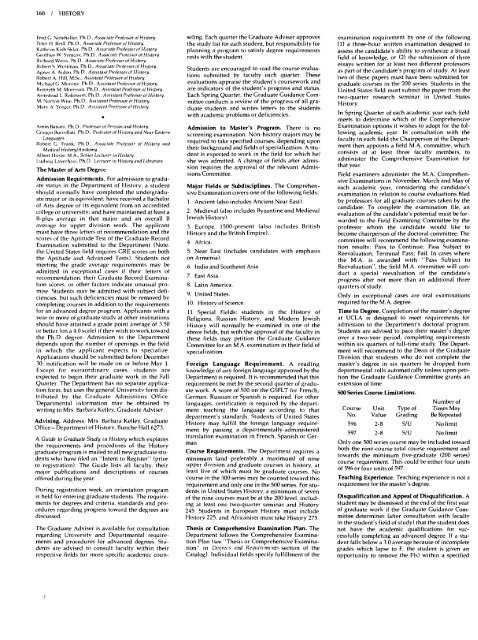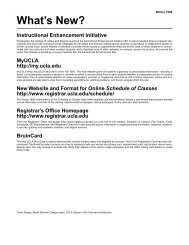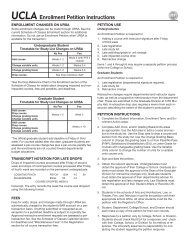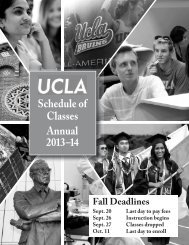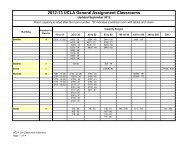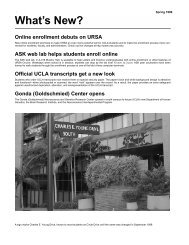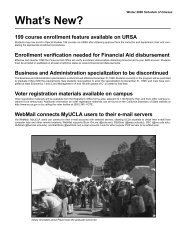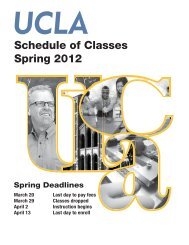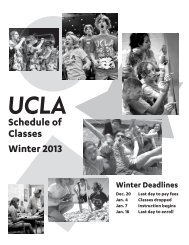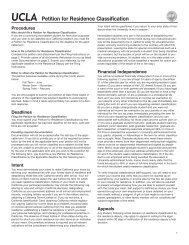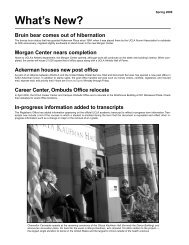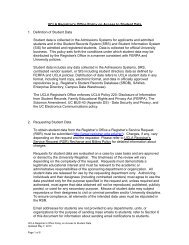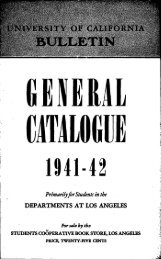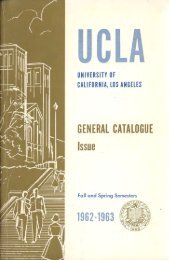UCLA Graduate Catalog 1980-81 - Registrar - UCLA
UCLA Graduate Catalog 1980-81 - Registrar - UCLA
UCLA Graduate Catalog 1980-81 - Registrar - UCLA
You also want an ePaper? Increase the reach of your titles
YUMPU automatically turns print PDFs into web optimized ePapers that Google loves.
160 / HISTORY<br />
Fred C. Notehel fer, Ph.D., Associate Professor of History.<br />
Peter H. Reil I. Ph.D., Associate Professor of History.<br />
Kathryn Kish Sklar, Ph, D., Associate Professor of History.<br />
Geoffrey W Svmcox, Ph.D., Associate Professor of History.<br />
Richard Weiss, Ph.D.. Associate Professor of History.<br />
Robert S. Westman, Ph.D., Associate Professor of History.<br />
Agnes A Aidoo, Ph.D., Assistant Professor of History.<br />
Robert A. Hill, M.Sc., Assistant Professor of History.<br />
Michael C. Moronv, Ph.D., Assistant Professor of History.<br />
Kenneth M. Morrison, Ph.D., Assistant Professor of History.<br />
Armstead L. Robinson, Ph.D., Assistant Professor of History.<br />
M. Norton Wise, Ph.D., Assistant Professor of History.<br />
Marv A. Yeager, Ph.D.. Assistant Professor of History.<br />
Amin Banani. Ph D, Professor of Persian and History.<br />
Giorgio Buccellati. Ph.D., Professor of History and Near Eastern<br />
Languages.<br />
Robert C. Frank, Ph.D., Associate Professor of History and<br />
Medical History/Anatomy.<br />
Albert Hoxie, M.A., Senior Lecturer in History.<br />
Ludwig Lauerhass, Ph.D., Lecturer in History and Librarian.<br />
The Master of Arts Degree<br />
Admission Requirements. For admission to graduate<br />
status in the Department of History, a student<br />
should normally have completed the undergraduate<br />
major or its equivalent; have received a Bachelor<br />
of Arts degree or its equivalent from an accredited<br />
college or university; and have maintained at least a<br />
B-plus average in that major and an overall B<br />
average for upper division work. The applicant<br />
must have three letters of recommendation and the<br />
scores of the Aptitude Test of the <strong>Graduate</strong> Record<br />
Examination submitted to the Department (Note:<br />
the United States field requires GRE scores on both<br />
the Aptitude and Advanced Tests). Students not<br />
meeting the grade average requirements may be<br />
admitted in exceptional cases if their letters of<br />
recommendation, their <strong>Graduate</strong> Record Examination<br />
scores, or other factors indicate unusual promise.<br />
Students may be admitted with subject deficiencies,<br />
but such deficiencies must be removed by<br />
completing courses in addition to the requirements<br />
for an advanced degree program. Applicants with a<br />
year or more of graduate study at other institutions<br />
should have attained a grade point average of 3.50<br />
or better (on a 4.0 scale) if they wish to work toward<br />
the Ph.D. degree. Admission to the Department<br />
depends upon the number of openings in the field<br />
in which the applicant expects to specialize.<br />
Applications should be submitted before December<br />
30; notification will be made on or before May 1.<br />
Except for extraordinary cases, students are<br />
expected to begin their graduate work in the Fall<br />
Quarter. The Department has no separate application<br />
form, but uses the general University form distributed<br />
by the <strong>Graduate</strong> Admissions Office.<br />
Departmental information may be obtained by<br />
writing to Mrs. Barbara Kelley, <strong>Graduate</strong> Adviser.<br />
Advising . Address: Mrs. Barbara Kelley, <strong>Graduate</strong><br />
Office- Department of History, Bunche Hall 6273.<br />
A Guide to <strong>Graduate</strong> Study in History which explains<br />
the requirements and procedures of the History<br />
graduate program is mailed to all new graduate students<br />
who have filed an "Intent to Register" (prior<br />
to registration). The Guide lists all faculty, their<br />
major publications and descriptions of courses<br />
offered during the year.<br />
During registration week, an orientation program<br />
is held for entering graduate students. The requirements<br />
for degrees and criteria, standards and procedures<br />
regarding progress toward the degrees are<br />
discussed.<br />
The <strong>Graduate</strong> Adviser is available for consultation<br />
regarding University and Departmental requirements<br />
and procedures for advanced degrees. Students<br />
are advised to consult faculty within their<br />
respective fields for more specific academic coun-<br />
seling. Each quarter the <strong>Graduate</strong> Adviser approves<br />
the study list for each student, but responsibility for<br />
planning a program to satisfy degree requirements<br />
rests with the student.<br />
Students are encouraged to read the course evaluations<br />
submitted by faculty each quarter. These<br />
evaluations appraise the student's coursework and<br />
are indicators of the student's progress and status.<br />
Each Spring Quarter, the <strong>Graduate</strong> Guidance Committee<br />
conducts a review of the progress of all graduate<br />
students and writes letters to the students<br />
with academic problems or deficiencies.<br />
Admission to Master 's Program . There is no<br />
screening examination. Non-history majors may be<br />
required to take specified courses, depending upon<br />
their background and fields of specialization. A student<br />
is expected to work in the field for which he/<br />
she was admitted. A change of fields after admission<br />
requires the approval of the relevant Admissions<br />
Committee.<br />
Major Fields or Subdisciplines . The Comprehensive<br />
Examination covers one of the following fields:<br />
1. Ancient (also includes Ancient Near East).<br />
2. Medieval (also includes Byzantine and Medieval<br />
Jewish History).<br />
3. Europe, 1500-present (also includes British<br />
History and the British Empire).<br />
4. Africa.<br />
5. Near East (includes candidates<br />
on Armenia).<br />
6. India and Southeast Asia.<br />
7. East Asia.<br />
8. Latin America.<br />
9. United States.<br />
with emphasis<br />
10. History of Science.<br />
11. Special Fields: students in the History of<br />
Religions, Russian History, and Modern Jewish<br />
History will normally be examined in one of the<br />
above fields, but with the approval of the faculty in<br />
these fields may petition the <strong>Graduate</strong> Guidance<br />
Committee for an M A. examination<br />
specialization.<br />
in their field of<br />
Foreign Language Requirement. A reading<br />
knowledge of any foreign language approved by the<br />
Department is required. It is recommended that this<br />
requirement be met by the second quarter of graduate<br />
work. A score of 500 on the GSFLT for French,<br />
German, Russian or Spanish is required. For other<br />
languages, certification is required by the department<br />
teaching the language according to that<br />
department's standards. Students of United States<br />
History may fulfill the foreign language requirement<br />
by passing a departmentally-administered<br />
translation examination in French, Spanish or German.<br />
Course Requirements . The Department requires a<br />
minimum (and preferably a maximum) of nine<br />
upper division and graduate courses in history, at<br />
least five of which must be graduate courses. No<br />
course in the 300 series may be counted toward this<br />
requirement and only one in the 500 series . For students<br />
in United States History, a minimum of seven<br />
of the nine courses must be at the 200 level, including<br />
at least one two-quarter seminar and History<br />
245. Students in European History must include<br />
History 225, and Africanists must take History 275.<br />
Thesis or Comprehensive Examination Plan. The<br />
Department follows the Comprehensive Examination<br />
Plan (see "Thesis or Comprehensive Examination"<br />
in Degrees and Requirements section of the<br />
<strong>Catalog</strong>). Individual fields specify fulfillment of the<br />
examination requirement by one of the following<br />
(1) a three-hour written examination designed to<br />
assess the candidate's ability to synthesize a broad<br />
field of knowledge, or (2) the submission of three<br />
essays written for at least two different professors<br />
as part of the candidate's program of study. At least<br />
two of these papers must have been submitted for<br />
graduate courses in the 200 series. Students in the<br />
United States field must submit the paper from the<br />
two-quarter<br />
History.<br />
research seminar in United States<br />
In Spring Quarter of each academic year each field<br />
meets to determine which of the Comprehensive<br />
Examination options it wishes to adopt for the following<br />
academic year. In consultation with the<br />
faculty in each field the Chairperson of the Department<br />
then appoints a field M.A. committee, which<br />
consists of at least three faculty members, to<br />
administer the Comprehensive Examination for<br />
that year.<br />
Field examiners administer the M.A. Comprehensive<br />
Examinations in November, March and May of<br />
each academic year, considering the candidate's<br />
examination in relation to course evaluations filed<br />
by professors for all graduate courses taken by the<br />
candidate. To complete the examination file, an<br />
evaluation of the candidate's potential must be forwarded<br />
to the Field Examining Committee by the<br />
professor whom the candidate would like to<br />
become chairperson of the doctoral committee. The<br />
committee will recommend the following examination<br />
results: Pass to Continue; Pass Subject to<br />
Reevaluation; Terminal Pass; Fail. In cases where<br />
the M.A. is awarded with "Pass Subject to<br />
Reevaluation", the field M.A. committee will conduct<br />
a special reevaluation of the candidate's<br />
progress after not more than an additional<br />
quarters of study.<br />
three<br />
Only in exceptional cases are oral examinations<br />
required for the M.A.degree.<br />
Time to Degree. Completion of the master's degree<br />
at <strong>UCLA</strong> is designed to meet requirements for<br />
admission to the Department's doctoral program.<br />
Students are advised to pace their master's degree<br />
over a two-year period, completing requirements<br />
within six quarters of full-time study. The Department<br />
will recommend to the Dean of the <strong>Graduate</strong><br />
Division that students who do not complete the<br />
master's degree in six quarters be dropped from<br />
departmental rolls automatically unless upon petition<br />
the <strong>Graduate</strong> Guidance Committee grants an<br />
extension of time.<br />
500 Series Course Limitations.<br />
Number of<br />
Course Unit Type of Times May<br />
No. Value Grading Be Repeated<br />
596 2-8 S/U No limit<br />
597 2-8 S/U No limit<br />
Only one 500 series course may be included toward<br />
both the nine-course total course requirement and<br />
towards the minimum five-graduate (200 series)<br />
course requirement. This could be either four units<br />
of 596 or four units of 597.<br />
Teaching Experience . Teaching experience is not a<br />
requirement for the master's degree.<br />
Disqualification and Appeal of Disqualification. A<br />
student may be dismissed at the end of the first year<br />
of graduate work if the <strong>Graduate</strong> Guidance Committee<br />
determines (after consultation with faculty<br />
in the student's field of study) that the student does<br />
not have the academic qualifications for successfully<br />
completing an advanced degree. If a student<br />
falls below a 3.0 average because of incomplete<br />
grades which lapse to F, the student is given an<br />
opportunity to remove the F(s) within a specified


